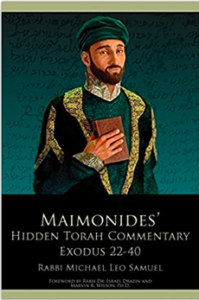Maimonides’ Hidden Torah Commentary — Exodus 22-40 by Rabbi Michael Leo Samuel; First Edition Design Publishing 2021; ISBN: 9781506-904610; 386 pages; $24.95.
By Rabbi Dr. Israel Drazin

BOCA RATON, Florida — “Maimonides’ Hidden Torah Commentary — Exodus 22-40″ is a very informative book. Rabbi Michael Leo Samuel, spiritual leader of Temple Beth Shalom in Chula Vista, has made a significant contribution to posterity by writing it and bringing to his readers the thinking of Maimonides and many dozens of others, ancient and modern, Jewish and non-Jewish, rational and mystic. This volume follows his successful books on Maimonides’ Hidden Torah Commentary on Genesis and his book on the early chapters of Exodus. He reveals much about the great Jewish philosopher as he assembles Maimonides’ Torah commentary from a plethora of Maimonides’ works that include: Mishneh Torah, his Guide for the Perplexed, his Commentary to the Mishnah, his ethical work Shemoneh Perakim, as well as his Responsa.
He reveals much of what many people do not know and does so in a clear, easy-to-read, engaging fashion. He tells readers much about Maimonides’ unique understanding of the Bible and Judaism. Maimonides’ ideas are often subtle and can be difficult at times to understand. Samuel explains Maimonides’ insights about the Exodus and concepts implicit in the biblical book but not stated explicitly. He includes the views and teachings of many scholars, even many of Maimonides’ greatest critics such as Ramban, Ra’avad, and others who did not always see eye to eye with this great scholar. In addition, Samuel expands the field of discussion to include other notable Jewish scholars — ancient and modern, together with non-Jewish scholars like Aristotle, Aquinas, Augustine, M. Eliade, and Carl G. Jung, for, as he stressed, the truth is the truth no matter what its source.

Rational philosophers and even mystics stressed Maimonides’ teaching about taking truths from all sources, Jewish and non-Jewish. The famed Kabbalist Rabbi Haim Attar (1696-1743) asked in his book Or Ha-Haim, in his commentary to Exodus 18:21, why does the Bible tell us the story of the Midianite pagan priest Jethro offering advice to the law-giver Moses and adds that Moses implemented the priest’s advice? Isn’t there enough knowledge among Jews? Why go to non-Jews for advice? Rabbi Attar answered that the Bible is teaching us that there are non-Jews with greater knowledge than Jews in all generations. This point applies to all of Maimonides’ writings.
In the interest of brevity, I will touch on a few themes from this book:
- Much of this work focuses on the “mishpatim,” the social laws that have long governed civil society. He gives us new insights. For example, Maimonides’ views on the “eye for an eye” provide a profound lesson on why the penalty must fit the crime.
- Samuel discusses in fine detail the debate among medieval scholars as to how the menorah appeared. Was it angular? Or was it curved, as we see in the archaeological depictions? Aside from being a medieval debate, Samuel also shows how the late Lubavitcher Rebbe dismissed all archaeological evidence of how the menorah really looked out of deference for his support of Maimonides.
- Maimonides stressed that the sacredness of human life overrides all the Sabbath rules and regulations — both biblical and rabbinical. Even war must be fought on the Sabbath for the preservation of human life.
- When Exodus 20:5 states that God will visit “the iniquity of the fathers upon the children to the third and fourth generation” it should not be understood to mean that God is causing the evil-doers’ descendants’ pain. What happens to the children is natural law. If children are brought up in a home where crime is taught and performed, chances are that they will continue to do what they were taught and that they will teach wrong behavior to their children.
- Nowhere did Maimonides ever subscribe to the Midrashic miraculous view of Rashi that the golden calf “made itself.”
- Sometimes Maimonides says much by saying nothing on a topic. In the census count of Exodus 30:12, it is instructive that Maimonides never said anything about the “evil eye,” a belief that nearly all his rabbinical colleagues believed in.
If these items were all that Rabbi Dr. Michael Leo Samuel addressed, we would be ever thankful for his gift to us, but they are a very small sample of the treasures he places before us.
*
Rabbi Dr. Israel Drazin is a retired brigadier general in the U.S. Army chaplain corps and the author of more than 50 books.